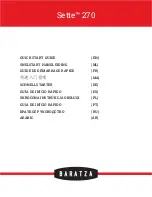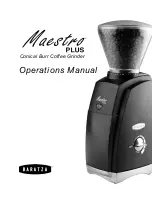
16
ENGLISH
Installing or removing Ezynut
Optional accessory
Only for tools with M14 spindle thread.
CAUTION:
Do not use Ezynut w ith Super
Flange or angle grinder w ith “F” on the end of
the model No. Those anges are so thick that the
entire thread cannot be retained by the spindle.
Mount inner flange, abrasive wheel and Ezynut onto the
spindle so that Makita Logo on Ezynut faces outside.
Fig.16:
1.
Ezynut
2.
Abrasive wheel
3.
Inner flange
4.
Spindle
Press shaft lock firmly and tighten Ezynut by turning the
abrasive wheel clockwise as far as it turns.
Fig.17:
1.
Shaft lock
To loosen the Ezynut, turn the outside ring of Ezynut
counterclockwise.
NOTE:
Ezynut can be loosened by hand as long
as the arrow points the notch. Otherwise a lock nut
wrench is required to loosen it. Insert one pin of the
wrench into a hole and turn Ezynut counterclockwise.
Fig.18 :
1.
Arrow
2.
N otch
Fig.19
Installing or removing abrasive disc
Optional accessory
Fig.20:
1.
Sanding lock nut
2.
Abrasive disc
3.
Rubber pad
1.
Mount the rubber pad onto the spindle.
2.
Fit the disc on the rubber pad and screw the sand
-
ing lock nut onto the spindle.
3.
Hold the spindle with the shaft lock, and securely
tighten the sanding lock nut clockwise with the lock nut
wrench.
To remove the disc, follow the installation procedure in
reverse.
NOTE:
Use sander accessories specified in this man
-
ual. These must be purchased separately.
Connecting a vacuum cleaner
Optional accessory
WARNING:
Never vacuum metal particles
created by grinding/cutting/sanding operation.
Metal particles created by such operation are so hot
that they ignite dust and the filter inside the vacuum
cleaner.
To avoid dusty environment caused by masonry cut
-
ting, use a dust collecting wheel guard and a vacuum
cleaner.
Refer to the instruction manual attached to the dust
collecting wheel guard for assembling and using it.
Fig.21:
1.
Dust collecting wheel guard
2.
Hose of
the vacuum cleaner
OPERATION
WARNING:
It should never be necessary to
force the tool.
The weight of the tool applies ade
-
quate pressure. Forcing and excessive pressure
could cause dangerous wheel breakage.
WARNING:
ALWAYS replace w heel if tool is
dropped w hile grinding.
WARNING:
NEVER bang or hit grinding disc
or w heel onto w ork.
WARNING:
Avoid bouncing and snagging
the w heel, especially w hen w orking corners,
sharp edges etc.
This can cause loss of control and
kickback.
WARNING:
NEVER use tool w ith w ood cutting
blades and other saw blades.
Such blades when
used on a grinder frequently kick and cause loss of
control leading to personal injury.
CAUTION:
Never sw itch on the tool w hen it
is in contact w ith the w orkpiece, it may cause an
injury to operator.
CAUTION:
Alw ays w ear safety goggles or a
face shield during operation.
CAUTION:
After operation, alw ays sw itch off
the tool and w ait until the w heel has come to a
complete stop before putting the tool dow n.
CAUTION:
ALWAYS hold the tool firmly with
one hand on housing and the other on the side
grip (handle).
Grinding and sanding operation
Fig.22
Turn the tool on and then apply the wheel or disc to the
workpiece.
In general, keep the edge of the wheel or disc at an
angle of about
to the workpiece surface.
During the break-in period with a new wheel, do not
work the grinder in forward direction or it may cut into
the workpiece. Once the edge of the wheel has been
rounded off by use, the wheel may be worked in both
forward and backward direction.
Summary of Contents for DGA701
Page 2: ...1 2 3 Fig 1 1 2 Fig 2 1 Fig 3 1 Fig 4 1 2 Fig 5 1 Fig 6 Fig 7 1 2 3 Fig 8 2 ...
Page 5: ...1 Fig 25 1 Fig 26 2 1 3 4 5 6 7 Fig 27 Fig 28 1 Fig 29 4 3 1 2 Fig 30 1 2 3 Fig 31 5 ...
Page 6: ...1 Fig 32 1 2 2 1 Fig 33 Fig 34 1 Fig 35 2 1 Fig 36 1 Fig 37 6 ...
Page 7: ...1 Fig 38 1 2 2 1 Fig 39 1 2 Fig 40 2 1 Fig 41 1 Fig 42 7 ...
Page 8: ...1 8 2 3 5 6 3 13 2 5 4 14 15 16 17 18 12 7 5 10 6 7 19 20 3 5 11 5 8 9 Fig 43 8 ...
















































